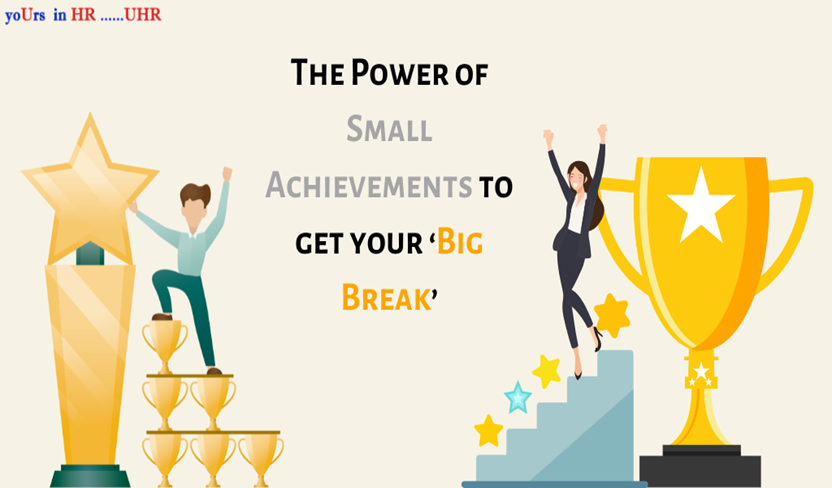
Bindiya had joined the company around two years ago, and so far, she felt she had not achieved what she wanted to achieve. She had big dreams- she wanted a cabin of her own, a business card and an email signature she can be proud about. But so far, all she had to boast was that she was a junior associate. In other words, according to her, nothing much had been ‘achieved’.
Divya, a senior colleague and a friend of Bindiya’s walked in and saw the latter’s cheerless visage. As she asked, Bindiya confided how she had been feeling like a failure since the past year and a half since it wasn’t the career graph she had been expecting. She had been in the workforce for the past four years or so and two years with the company, and felt she hadn’t had any progress.
‘Is it so? Have you had no progress at all? Think about it. I remember a few meetings you attended in this company in your first year. You were quiet, and barely seemed to be handling the information that had been thrown at you.
Now look at you! Remember the meeting we had last week? You were asking great questions, and at one point, you also offered to mentor the interns. Isn’t that progress?’
Bindiya’s mood lightened up a little. But she still felt that this was just a random glimmer in an otherwise lacklustre career. She said, ‘Yes, but I don’t feel like this is a very significant achievement…’
‘Is it so?’ Divya quipped. ‘Remember the very first report you drafted? You were asked to make so many corrections. Now, most of your reports get the approval, and it is almost given that since you have made the report, it is going to be a job well done!’
Bindiya smiled at Divya’s optimism and countered it with…well, her pessimism, saying, ‘These little achievements are fine. I am grateful that I have learned so much over these couple of years, but I do not see the point of these small successes. I need a big break. Something that actually changes things…’
Divya at this point shared a story, ‘You know our boss, how did he start his career? He was a personal assistant to the head of another company. This wasn’t a job that many considered great. But he nevertheless continued to do his job of an assistant well, and learnt all that he could.
‘By ‘all that he could’, I mean every little thing. Just like you, he improved over the years his networking skills through the meetings he attended with his boss, which he wasn’t even a major part of for many years. He continuously found smart ways to do his job as an assistant as efficiently as was possible for him. He learnt to take phenomenal minutes of meetings which over the years gave him a keen eye for small details and a meticulous way of doing things. He was the first one the interns talked to when they had to approach the boss, and eventually, he developed a way of creating rapports with new recruits. One day, his boss himself referred him to this company for the role of a junior manager, and now he is the boss since a couple of years!’
Bindiya was looking at Divya wide-eyed. ‘Really?’
‘Of course!’ Divya continued, ‘I am telling you this story because I want you to understand that life is made up of small achievements, that can eventually lead you to the ‘big break’ that you are talking about. You make the ‘big breaks’ happen through your small achievements; the big breaks don’t simply happen to you.
‘Celebrate your ‘small breaks’. Celebrate how you have improved over the years. Keep learning, just keep learning. Keep finding ways to do your present job well. We often underappreciate the small cumulative improvements we make with things. Celebrate them, learn from them, because eventually, they will only help us with our big break, and to make good use of our big break from all that we have learned.’
Bindiya finally felt her mood lift, and found a new dose of motivation to keep doing her work efficiently.
Life is made up of small achievements that could lead to the big break that we all want.
The point is to:
- Learn from your small breaks and achievements.
- Remember the cumulative power of regular small achievements.
- Remember that we stagnate only if we let ourselves stagnate- we can learn even from the smallest of tasks if we develop that famous growth mind-set we all must have heard of. Because what is growth mindset, if not developing a mentality to constantly learn?
- Do our job well, and do not pore on the designation and the status wars that come with it. What our designation is, we must do full justice to it.
Eventually, the small achievements take you to the moment that will give the big break. Not only that, the lessons you learn from small achievements could be applied lifelong, even with your big break!


